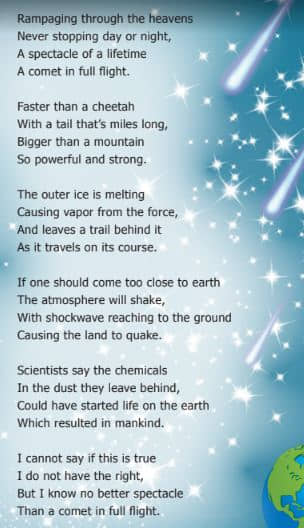TNPSC General English Part – B Study Materials :
Tamil Nadu Public Service Commission Group 2 or Combined Civil Service Examination II has 3 tier examination for the selection process. For Preliminary Examination is an objective type (Written Examination) with a maximum of 300 marks. TNPSC Group 2 Prelims examination – General English/ General Tamil portion topic has 50% of total marks. Candidates who are preparing for the TNPSC Group 2 General English Part are more important and you can score maximum marks in this part.
The General English portion is of 3 Parts – Part A: Grammar, Part B: Poem, and Part C: Literature. Part B Poem topic study materials PDF are readily available and given below for those who preparing for TNPSC Group 2 Exam.
TNPSC Group 2 General English –Poem The Comet Appreciation and Figure of Speech topic question and answers solutions PDF given below,
TNPSC Group 2 – Poetry Appreciation Questions:
Read the following lines and answer the following.
1. “Rampaging through the heavens Never stopping day or night, ”
a. How does the comet travel?
Ans: The comet travel by making a lot of noise and causing damage.
b. Which word could you replace ‘rampaging’ with?
a. charging b. rolling c. speeding d. flying
Ans: Rampaging can be replaced with charging.
2. “Faster than a cheetah With a tail that’s miles long.”
a. Why is the comet compared to a cheetah?
Ans: The cheetah is the fastest running animal. So the comet is compared to the cheetah.
b. Whose tail is compared here?
Ans: Comet’s tail is compared here.
3. “With shockwave reaching to the ground Causing the land to quake”
a. What is reaching the ground?
Ans: The shockwave is reaching the ground.
b. What is causing the land to quake?
Ans: The shockwave causes the earth to quake.
4. “In the dust, they leave behind,
Could have started life on the earth Which resulted in mankind”
a. What does the word ‘they’ refer to?
Ans: They refer to the comet.
b. According to scientists, how did life start on earth?
Ans: According to scientists, life started on earth from dust.
5. “But I know no better spectacle Than a comet in full flight”
a. Who does ‘I’ refer to?
Ans: ‘I’ refers to the poet, Norman Little ford.
b. What is the best spectacle mentioned in the above lines?
Ans: The best spectacle is the comet in full flight.
6. “A spectacle of a lifetime A comet in full flight.”
a. Why is it considered a ‘spectacle of a lifetime’?
Ans: The word spectacle indicates an unusual event that attracts attention. Hence it is considered a spectacle of a lifetime.
b. Describe a comet?
Ans: Comets are small, fragile, irregularly shaped bodies composed of a mixture of frozen gases.
7. “The outer ice is melting Causing vapor from the force, ”
a. Why is the outer ice melting?
Ans: The outer ice is found around the comet and it is melting because it speeds past the sun.
b. Why is the vapor spelt without an ‘u’?
Ans: ‘Vapor’ is spelt without an ‘u’ since the poet Norman Littleford is an American.
8. “Rampaging through the heavens Never stopping day or night,
A spectacle of a lifetime A comet in full flight. ”
a. Pick out the rhyming words in the above lines.
Ans: The rhyming words are night and flight.
b. Give the rhyme scheme of the above stanza.
Ans: ‘abcb’ is the rhyme scheme of the above stanza.
c. Mention the poetic device employed in the last line.
Ans: The poetic device employed in the last line is Alliteration.
4. “If one should come too close to earth
The atmosphere will shake,
With shockwave reaching to the ground .
Causing the land to quake.”
a. What does ‘one’ refer to?
Ans: ‘One’ refers to the comet in full flight.
b. Why shouldn’t a comet come too close to earth?
Ans: A comet shouldn’t come too close to the earth since it will shake the atmosphere.
c. Pick out the rhyming words.
Ans: ‘shake’ and ‘quake’ is the rhyming words.
5. “Scientists say the chemicals In the dust they leave behind,
Could have started life on the earth Which resulted in mankind.”
a. What do the scientist feel?
Ans: The scientists feel that mankind started to emerge on this earth only from the chemicals left behind in the dust caused by the comets when they fell on the earth.
b. Give the rhyme scheme of the above stanza.
Ans: ‘abcb’ is the rhyme scheme of the above stanza.
c. Give the rhyming word for behind.
Ans: The rhyming word for behind is mankind.
6. If one should come too close to the earth
The atmosphere will shake,
With shock waves reaching to the ground
Causing the land to quake.
1. Pick out the rhyming words.
Ans: Shake, quake.
2. Mention the rhyme scheme of the stanza.
Ans: ‘abcb’ is the rhyme scheme of the above stanza.
3. What will happen when a comet will fall on the earth?
Ans: If the comet were to hit the Earth, it would cause a huge explosion.
Important links for TNPSC Group 2 General English Study Materials:
- Click Here For TNPSC Group 2 General English Part B Poem – The Stick-together Families
- For Complete Part B Poem Figures of Speech – TNPSC Gr 2 General English Study Materials

